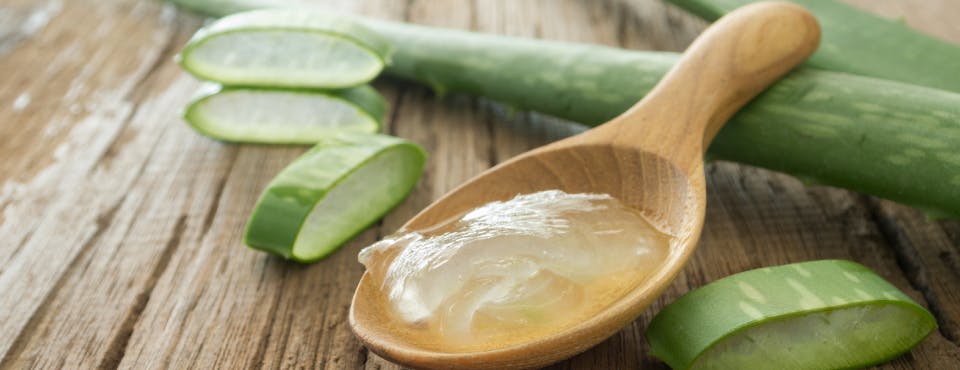
Aloe Vera for Cold Sores
Topical aloe vera is a popular home-remedy for a number of ailments, from sunburn to acne. Some even tout its benefits for helping heal cold sores. Below, we investigate whether putting aloe vera on cold sores will help or hurt the problem. Keep reading to get the scoop!
What Is Aloe Vera?
There are over 420 species of aloe, which is a type of succulent plant. The “aloe vera” from which most topical aloe products are made is specifically the Aloe barbadensis Miller, 1 a perennial plant that grows in tropical, semi-tropical, and arid climates including Texas, New Mexico, Arizona, and California.2
Aloe vera is also a popular houseplant, as it thrives in bright light and doesn’t require a lot of watering. Plus, the added benefit of keeping an aloe plant in your indoor garden means you have easy access to its gel, which might come in handy when you have a sunburn or other skin condition that needs soothing! We’ll explain why in the next section.
Alternative Medicine Uses for Aloe Vera
Topical use of aloe vera has been promoted as a solution for a number of skin issues, and some go so far as to say it can help heal wounds and reverse balding. 3 Alternative practitioners recommend aloe to treat acne, lichen plauns (an inflammatory condition that occurs on the skin or in the mouth), oral submucous fibrosis, radiation-induced skin toxicity, and burns. 4 The aloe vera plant’s leaves have a tough outer rind which encases the plant’s soft gel. When used topically, the clear gel is the part of the plant applied to the skin or added as an ingredient to other topical aloe products.5
Something that’s less widely known is that aloe vera is sometimes used orally in alternative medicine as well. The various oral applications of aloe include treatment for diabetes, hepatits, inflammatory bowel disease, and help with weight loss. 6 In these cases, the outer, green part of the plant’s leaf is dried or made into juice.7
What Does the Science Say?
There have been a number of studies that have indicated some benefits of using aloe vera both topically and as a dietary supplement, but the short answer is that it’s impossible to make any definite claims about the plant. When it comes to its topical application, there is clinical research that suggests applying aloe vera might help reduce pain and speed up healing for burns, as well as help those suffering from the symptoms of psoriasis, lichen planus, and herpes simplex. 8 There is also some clinical research that suggests using an aloe-based gel together with medical soap and tretinoin gel twice a day might help improve acne.9
The research around oral applications of aloe vera are a little murkier. One European study on 44 adults with ulcerative colitis showed that around half of the participants treated with aloe vera responded whereas only 14 percent of the participants treated with a placebo responded. 10 Another set of trials studying irritable bowel syndrome showed benefits from oral aloe vera usage over a placebo only one out of three times. 11 Since safety data and research around oral usage of aloe vera is still lacking, the U.S. Food and Drug Administration ruled in 2002 that aloe must be removed from over-the-counter laxative products.12
Is Aloe Vera Gel Safe to Use Topically?
Even though the health benefits of applying aloe vera topically have not been 100% proven by research, aloe vera has generally been deemed safe for use on skin. 13 That being said, every person is different, and some people report itching, burning, and eczema outbreaks associated with the use of aloe gel.14 Like any new product or medication, talk to your physician or dermatologist before experimenting with the use of topical aloe vera gel for various skin conditions including cold sores.
So, What About Aloe Vera Gel for Cold Sores?
As noted above, the research on aloe vera use is still ongoing so it’s impossible to give a definitive “yes” or “no” on aloe vera gel’s positive benefits on cold sores. If you’re looking for a stronger treatment option for cold sores, using an Abreva cold sore cream is an option backed by conclusive research and, unlike aloe vera, contains an ingredient approved by the FDA to shorten cold sore healing time.
We all know that dealing with cold sores can be uncomfortable and interfere with everyday life, which is why searching for home remedies like aloe vera is an attractive option. Beyond treating cold sore symptoms, it’s also important to understand lifestyle changes and other factors that can trigger cold sores. For helpful resources on these topics, check out our articles on how to stay trigger free on summer vacation, relaxation techniques to help manage cold sores, the connection between hormones and cold sores, and how to navigate a cold sore breakout with confidence.
SOURCES
1, 5, 7. Aloe Vera. National Institute of Environmental Health Sciences. https://www.niehs.nih.gov/health/topics/agents/aloe/index.cfm. Accessed 2/6/21. Referenced text indicated on page 1 in source PDF.
2-4, 6, 8-9. Aloe Vera. National Center for Complementary and Integrative Health. https://www.nccih.nih.gov/health/aloe-vera. Accessed 2/6/21. Referenced text indicated on page 1 in source PDF.
10-12, 14. Aloe Vera. National Center for Complementary and Integrative Health. https://www.nccih.nih.gov/health/aloe-vera. Accessed 2/6/21. Referenced text indicated on page 2 in source PDF.
13. 5 Tips: What You Should Know About Popular Herbs. National Center for Complementary and Integrative Health. https://www.nccih.nih.gov/health/tips/tips-what-you-should-know-about-popular-herbs. Accessed 2/6/21. Referenced text indicated on page 1 in source PDF.
SEASONAL,FATIGUE,STRESS,HORMONES,DENTAL TRAUMA,COLD & FLU




